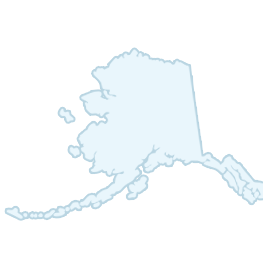Key Takeaways
- Medicare in Alaska is mostly like Medicare in the 48 contiguous states, with eligibility starting at age 65 outside of a few exceptions.
- Alaska offers several cost-savings programs for residents facing financial needs and for anyone on Medicare looking to control costs related to prescriptions and out-of-pocket expenditures like copaysA copayment is the fixed amount you pay directly to your provider for medical services or prescription drugs covered in your plan. For example: If your plan includes a copayment of $20 for office visits, you’ll pay $20 to your doctor whenever you have an appointment. and coinsuranceCoinsurance is the percentage of your medical costs that you pay after you meet your deductible. Your insurance company pays the remaining amount. For example: If you have a $1,000 medical bill and your coinsurance is 20%, you’ll pay $200. Your insurance company will cover the final $800. .
- Medicare Advantage plans are not currently available in Alaska.
Alaskans can hop in the car and drive to the continental United States. Just make sure your car seat is a comfortable one.
It’s more than a 2,000-mile drive from Alaska to Seattle in the northwest corner of the lower 48. Much like the typical journey into the world of Medicare, the endeavor can be daunting.
GoHealth is here to straighten out the learning curve and put you in the driver’s seat.
Does Medicare Cover You in Alaska?
Since 1965, Medicare has provided affordable healthcare coverage to older Americans, and that certainly includes Alaskans. If you enroll in Medicare in Alaska, you can use your benefits with any provider in the United States that accepts Medicare, which is most.
While Medicare doesn’t typically cover you outside of the U.S., if you’re an Alaskan traveling between your home state and the continental U.S. via Canada, you are covered if a medical emergency arises in transit. The same applies to residents of the continental U.S. traveling to Alaska via Canada.
Have questions about your Medicare coverage?
How Do I Apply for Medicare in Alaska?
You are eligible to get Medicare in AK if you’re a U.S. citizen age 65 or older. Regardless of your age, you can enroll in Medicare if you have end-stage renal disease or Lou Gehrig’s disease or have received Social Security Disability Insurance payments or Railroad Board benefits payments for 24 months.
Your first chance to enroll is during the Initial Enrollment Period (IEP). Your IEP is a seven-month period that begins three months before the month you turn 65.
- You can enroll online with the Social Security Administration.
- You can enroll via phone by calling 1-800-772-1213 (TTY: 1-800-325-0778).
- You can enroll by visiting a local Social Security office.
If you enroll in both Parts A and B, you have the option to add Part D to cover a portion of your prescription expenses. You may also choose to add Medigap, which is supplemental coverage that helps fill in the gaps in out-of-pocket costs like copays and coinsurance.
Private insurance companies administer part D and Medigap under rules set by the federal Medicare program.
Does Alaska Have Free Healthcare?
Medicare beneficiaries who have paid employment-related taxes for at least 10 years don’t have to pay a monthly premium for Part A of Original Medicare. However, the coverage is not “free” because of the deductibles, copays, and coinsurance responsibilities associated with Medicare plans in Alaska.
If you need free or low-cost health insurance because of your financial situation, some people on Medicare in Alaska can save through a Medicare Savings Program. In contrast, some facing severe needs may qualify for Medicaid. In Alaska, the Medicaid program is called DenaliCare, and the state sets specific income limits on an annual basis for an array of situations. The state provides a tool to give Alaskans an idea about whether they qualify, but an accurate determination can only be made by applying.
Looking for dental, vision and hearing coverage?
Is Medicare the Same in All 50 States?
Because Medicare is a federal insurance program, the core elements of Medicare are the same in each state, but there are some exceptions.
- Some people on Medicare in Alaska also will qualify for Medicaid based on financial need. While the two programs, both started in 1965, have a lot in common, Medicaid standards can be set on the state level, creating differences between Alaska and other states.
- You have the option to add Part D drug coverage or Medigap supplemental coverage to Original Medicare in Alaska. Under the federal Medicare program’s guidance, private insurance companies offer these products at different costs in different states. The Alaska Department of Health and Human Services provides a snapshot of Part D and Medigap in your state.
Are There Medicare Advantage Plans in Alaska?
Medicare Advantage plans are not currently available in Alaska.
Medicare Advantage bundles the hospital and medical coverage from Parts A and B of Original Medicare and some plans also include Part D drug coverage. Medicare Advantage also offers dental, hearing and vision coverage and many plans include a monthly stipend for purchasing over-the-counter supplies.
Thousands of older adults enroll in Medicare every day across the United States. The latest CMS data shows that 92,967 people are enrolled in Medicare Part A and B in Alaska. The total number of beneficiaries enrolled in Medicare Advantage increased from 1,912 to 2,066 year over year. Medicare Advantage participation in Alaska went from 2.12% to 2.22% year over year. If you’d like to dive deeper into how Medicare in Alaska breaks down across the state, we provide a glance at who is using Medicare and how.

92,967 Beneficiaries with Part A & Part B
2,066 Medicare Advantage Beneficiaries
2.22% Medicare Advantage Participation Rate
50.49% Female
49.51% Male
74.36% Non-Hispanic White
2.58% African American
2.75% Hispanic
20.31% Other/Unknown
22.14% Eligible for Medicaid
0.81 Average HCC Score
$9,456.80 Actual Per Capita Costs
14.28% Hospital Readmission Rate
22.09% % of Beneficiaries with an Emergency Department Visit
1,912 Medicare Advantage Beneficiaries, Previous Year
Increased Medicare Advantage, Year over year
2.12% Medicare Advantage Participation Rate, Previous Year
Table reflects the latest Beneficiary Demographics Data: Medicare Geographic Variation – by National, State & County
Average HCC Score: The Hierarchical Condition Category score gauges a population’s overall health. The score is based on a value of 1.0. Populations with an HCC score of less than 1.0 are considered relatively healthy. The score can be used to estimate health costs.
Looking for a plan with prescription drug coverage?
Medicare Information Office
https://health.alaska.gov/dsds/Pages/default.aspx
What should I know about Alaska’s Medicare Information Office?
The Alaska Department of Health and Human Services has counselors available to answer your Medicare questions.
Department of Commerce, Community, and Economic Development
Phone lines open M-F, 8 a.m. to 5 p.m.
https://www.commerce.alaska.gov/web/ins/Consumers/Complaints.aspx
What should I know about the Department of Commerce, Community, and Economic Development?
The department’s Division of Insurance fields insurance-related complaints.
Alaska Department of Health and Human Services
Offices open M-F, 8 a.m. to 5 p.m.; phone interviews M-F, 8 a.m. to 3 p.m.
https://health.alaska.gov/dsds/Pages/default.aspx
What should I know about the Alaska Department of Health and Human Services?
The department’s Public Assistance Offices help with Medicaid and other need-based programs.
Nationwide Resources
Speak with a GoHealth insurance agent that is licensed in Alaska about your Medicare questions.
Mon – Fri, 8 a.m. – 6 p.m. CT
Centers for Medicare and Medicaid Services
You can reach the Social Security Administration by phone for general questions. Not all questions can be answered over the phone.
Also, SSA.gov provides online resources for the following: Review information, apply for benefits, or manage your account online
1-800-722-1213
TTY 1-800-325-0778
Speak to SSA Representative, Monday – Friday, 8 AM – 7 PM ET
Medicare Learning Guides
Healthcare is personal. So is choosing insurance. If you are new to Medicare, a beneficiary researching options, or a caregiver, we have tailored Medicare Guides for you.

Before 65 Guide
Understanding health insurance before age 65, especially when considering early retirement

Medicare Plans Guide
Costs, coverage and enrollment details for each Medicare plan

Medicare Beneficiary Guide
For those currently enrolled in Medicare

Low Income and Medicare Guide
For individuals with a qualifying income status

A Caregiver's Guide
For individuals with a qualifying income status
Sources
- Travel outside the U.S. Medicare.gov.
- FACT SHEET. CMS.gov.
This website is operated by GoHealth, LLC., a licensed health insurance company. The website and its contents are for informational and educational purposes; helping people understand Medicare in a simple way. The purpose of this website is the solicitation of insurance. Contact will be made by a licensed insurance agent/producer or insurance company. Medicare Supplement insurance plans are not connected with or endorsed by the U.S. government or the federal Medicare program. Our mission is to help every American get better health insurance and save money.
Any information we provide is limited to those plans we do offer in your area. Please contact Medicare.gov or 1-800-MEDICARE to get information on all of your options.


